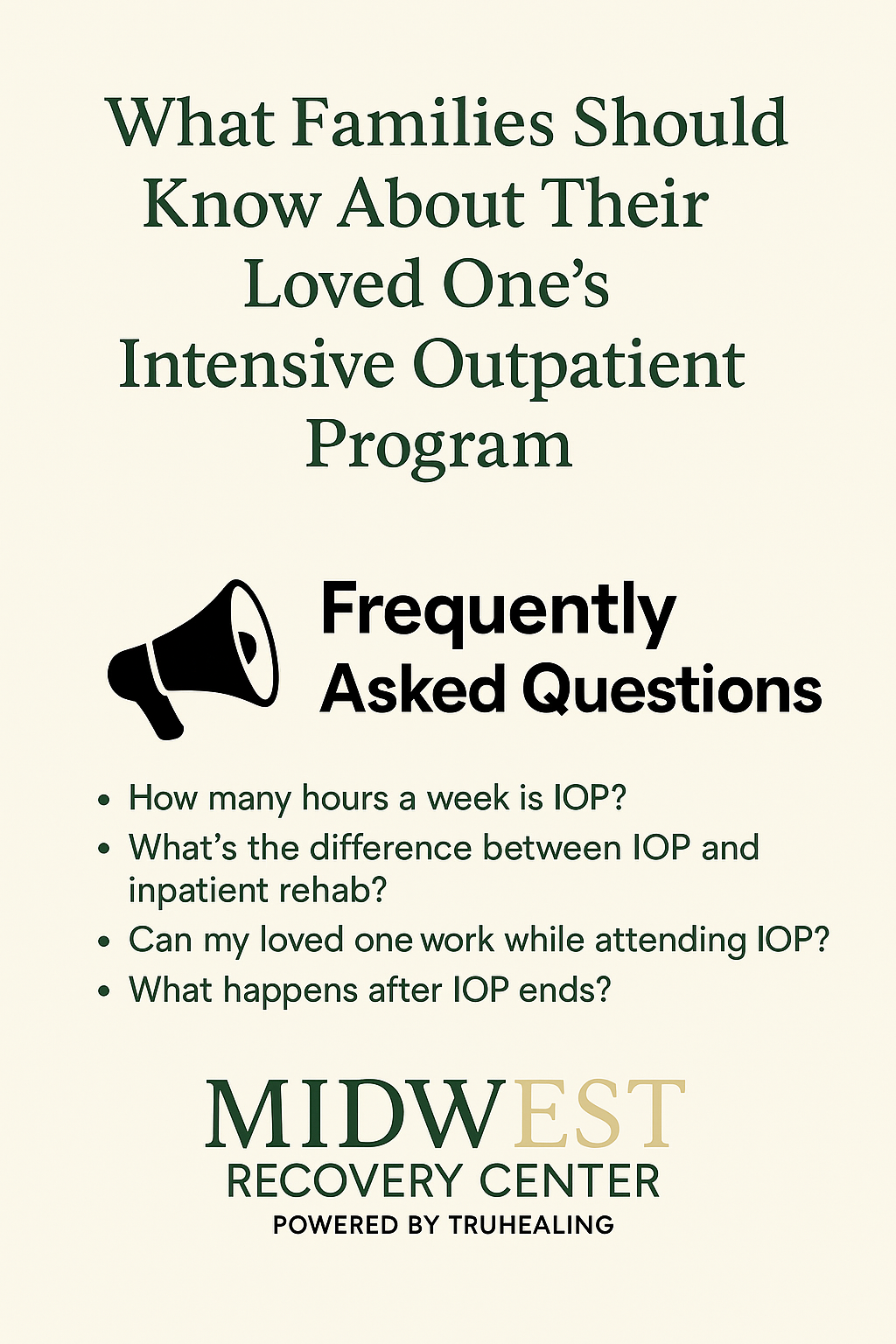When your loved one first agrees to treatment, it can feel like a breath of fresh air—but then comes the surprise twist: they’re not going away. They’ll be home, eating dinner with you, showing up to work, maybe still driving the carpool, while spending several hours a week in treatment. This is the confusing, in-between world of the intensive outpatient program (IOP), and it’s where a lot of families start wondering, What’s my role in this?
Let’s get real—supporting someone in IOP feels different than the Hollywood version of treatment. There’s no dramatic departure. No tearful homecoming. Just everyday life, with therapy sessions sandwiched between. For families who are used to tiptoeing around the issue or managing the fallout in secret, this stage comes with its own set of emotions—relief, resentment, hope, skepticism, and everything in between.
This guide is here to cut through the fog. No sugarcoating. No recovery jargon. Just the straight talk families need when their loved one steps into an intensive outpatient program.
1. IOP Is Real Treatment—But It Happens in Real Time
Unlike residential rehab, your loved one isn’t disappearing into a locked facility. With IOP, they stay rooted in their day-to-day life—sleeping in their own bed, attending work or school, dealing with real-world stress while getting structured treatment several days a week.
At Midwest Recovery Center in Toledo, the IOP structure usually involves 3–5 days per week of group therapy, individual counseling, and skills building. Think of it as boot camp for real life: intense enough to create change, flexible enough to apply it right away.
That means you’ll see their ups and downs in real time—not just the highlight reel.
2. The Changes Won’t Be Instagram-Pretty—And That’s Normal
Here’s what no one tells you: progress is often boring. Or messy. Or quietly uncomfortable. Your loved one may come home from therapy quieter, more irritable, or oddly introspective. Some days they might be energized, other days flat or drained. That’s not a red flag—it’s growth in motion.
This is especially true for high-functioning individuals who’ve gotten used to performing through their struggles. IOP invites them to drop the mask and face uncomfortable truths. Don’t expect fireworks. Expect slow shifts and awkward pauses—and know those moments are part of the healing process.
3. You Have a Role—But You’re Not the Project Manager
IOP is about their healing, but your patterns will get exposed too. Families often develop survival systems: over-functioning, rescuing, ignoring, or enabling. When your loved one steps into treatment, your routine gets disrupted too. It can feel destabilizing.
You don’t need to be their therapist or recovery guru—but you will need support. Family therapy, Al-Anon, or simply having an outlet for your emotions makes a difference. IOP is intense, but families can burn out just as fast if they don’t take care of their own recovery.
4. IOP Isn’t a Shortcut—It’s the Beginning of a New Normal
It’s tempting to see IOP as a fast-track to “normal life.” But make no mistake: this is just the groundwork. Recovery doesn’t end when sessions do. There will be homework—literally and emotionally. There may be relapse scares. Emotional walls may crumble and rebuild several times.
But here’s the upside: IOP plants recovery inside everyday life. It teaches your loved one to handle triggers in real time, build coping skills around real stressors, and interact with you and others in healthier ways.
This makes IOP a strong predictor of long-term success—when it’s supported properly.
5. The Struggle at Home Is Part of the Process, Not a Failure
One of the hardest parts for families? Watching someone leave therapy glowing with insight and then… slam the door during a petty argument an hour later.
That’s not proof treatment isn’t working—it’s proof that recovery is happening in the trenches. Don’t expect perfection. Expect friction. Expect moments where they slip into old behavior patterns. The difference is they now have tools—and you’re allowed to set boundaries while they practice using them.

6. IOP Has a Beginning, Middle, and End—But Recovery Doesn’t
Intensive outpatient programs don’t last forever. Most IOPs run for 6 to 12 weeks. After that, your loved one may step down to outpatient care or another aftercare plan.
IOP helps them stabilize, but what happens after matters just as much. Building support systems, continuing therapy, finding recovery groups—it all stacks up to long-term change. For families, this is where you get to breathe, recalibrate, and rebuild trust—not instantly, but gradually.
7. Why Toledo’s IOP Options Matter More Than You Think
Your location plays a role in recovery success. The Toledo intensive outpatient program at Midwest Recovery Center integrates the reality of living in northwest Ohio – Maumee, Perrysburg, Oregon. That means your loved one doesn’t have to pretend they live in a bubble—they’re preparing to thrive in the actual community they belong to.
From understanding local workplace dynamics to knowing the cultural landscape of the area, Midwest Recovery’s approach grounds recovery in your reality, not some distant ideal.
Frequently Asked Questions About Intensive Outpatient Programs
How many hours a week is IOP?
At Midwest Recovery Center, intensive outpatient typically runs 9 to 15 hours per week. This includes group therapy, individual counseling, and specialized sessions depending on your loved one’s needs.
What’s the difference between IOP and inpatient rehab?
Inpatient rehab involves 24/7 residential care, where clients live at the treatment center. IOP allows clients to live at home while attending structured therapy multiple days a week. It offers flexibility while maintaining accountability.
Can my loved one work while attending IOP?
Yes, many high-functioning individuals maintain their jobs while participating in IOP. The program is designed to fit around work or school commitments. However, flexibility and support from the workplace can be important during this period.
What happens after IOP ends?
After IOP, many clients transition into a standard outpatient program, recovery groups, or ongoing therapy. The goal is to sustain recovery with continued support while increasing independence.
Should I be involved in my loved one’s treatment?
Yes, but with boundaries. Midwest Recovery encourages family involvement through therapy and education sessions. Your role isn’t to police recovery—it’s to learn healthier dynamics and support without enabling.
Ready to Support Without Losing Yourself?
Intensive outpatient isn’t just treatment—it’s a transformation happening in real time. And while your loved one does the work, you’re allowed to reclaim your own peace too. At Midwest Recovery Center, we guide both individuals and families toward healthier lives.
📞 Call (888) 657-0858 or visit our intensive outpatient program services in Toledo, Ohio to learn how IOP can bring clarity, connection, and real-world recovery.


























